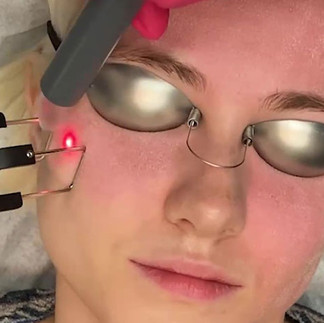Address Skin Discoloration Causes with Expert Advice
- Rejuvenus Clinic
- Sep 21, 2025
- 4 min read
Skin discoloration can affect anyone, causing uneven patches, dark spots, or lighter areas on the skin. These changes can impact confidence and may indicate underlying health issues. Understanding the reasons behind these changes and exploring effective skin discoloration treatments can help restore your skin’s natural tone and glow.

Understanding Skin Discoloration and Its Common Causes
Skin discoloration occurs when the skin produces too much or too little melanin, the pigment responsible for skin color. Various factors can trigger this imbalance, leading to conditions such as hyperpigmentation, hypopigmentation, melasma, or age spots.
Some common causes include:
Sun exposure: Ultraviolet (UV) rays stimulate melanin production, causing dark spots or patches.
Hormonal changes: Pregnancy, birth control pills, or hormone therapy can trigger melasma.
Inflammation or injury: Acne, eczema, or cuts can leave dark marks after healing.
Medications: Certain drugs may cause pigmentation changes as a side effect.
Genetics: Some people are more prone to pigmentation disorders due to their genetic makeup.
If you want to learn more about the specific skin discoloration causes, visiting a specialized clinic can provide personalized insights and treatment options.

Effective Skin Discoloration Treatments to Restore Your Skin
Treating skin discoloration requires a tailored approach depending on the cause and severity. Here are some of the most effective skin discoloration treatments available:
Topical Treatments
Hydroquinone: A bleaching agent that reduces dark spots by inhibiting melanin production.
Retinoids: Promote skin cell turnover and fade pigmentation.
Vitamin C serums: Antioxidants that brighten skin and reduce melanin synthesis.
Azelaic acid: Helps with acne-related discoloration and melasma.
Professional Procedures
Chemical peels: Use acids to exfoliate the top skin layers, revealing fresher skin underneath.
Laser therapy: Targets pigmented areas to break down excess melanin.
Microdermabrasion: Mechanical exfoliation that improves skin texture and tone.
Microneedling: Stimulates collagen production and can reduce pigmentation.
Lifestyle Adjustments
Sun protection: Use broad-spectrum sunscreen daily to prevent further discoloration.
Avoiding triggers: Identify and minimize exposure to factors that worsen pigmentation.
Healthy diet: Nutrient-rich foods support skin health and repair.
Consulting a dermatologist or skincare professional is essential to determine the best combination of treatments for your skin type and condition.

Which Deficiency Causes Darkening of Skin?
Certain nutritional deficiencies can contribute to skin darkening or uneven pigmentation. One notable example is Vitamin B12 deficiency. This vitamin plays a crucial role in skin cell metabolism and repair. When deficient, it can cause hyperpigmentation, especially on the hands and feet.
Other deficiencies linked to skin changes include:
Iron deficiency: Can cause pallor and sometimes dark circles under the eyes.
Vitamin D deficiency: May affect skin health and healing.
Zinc deficiency: Impairs wound healing and can cause skin discoloration.
If you notice unexplained darkening of your skin, it is advisable to get blood tests to check for these deficiencies. Correcting them through diet or supplements can improve your skin’s appearance and overall health.

Practical Tips to Prevent and Manage Skin Discoloration
Prevention is often the best strategy when it comes to skin discoloration. Here are some practical tips to keep your skin tone even and healthy:
Apply sunscreen daily: Choose SPF 30 or higher and reapply every two hours when outdoors.
Wear protective clothing: Hats, sunglasses, and long sleeves shield your skin from UV rays.
Avoid picking at skin: Scratching or squeezing pimples can cause post-inflammatory hyperpigmentation.
Use gentle skincare products: Harsh chemicals can irritate skin and worsen discoloration.
Stay hydrated: Drinking plenty of water supports skin regeneration.
Maintain a balanced diet: Include foods rich in antioxidants, vitamins, and minerals.
If discoloration persists or worsens, seek professional advice to explore advanced skin discoloration treatments.
When to Seek Professional Help for Skin Discoloration
While many cases of skin discoloration are harmless, some may signal underlying health issues or require medical intervention. You should consult a dermatologist if you experience:
Sudden or widespread changes in skin color
Discoloration accompanied by itching, pain, or swelling
Dark spots that grow, change shape, or bleed
Persistent discoloration despite home care
A professional can diagnose the cause accurately and recommend effective treatments, including prescription medications or in-clinic procedures.
Taking early action can prevent further skin damage and improve your skin’s appearance significantly.
Skin Discolouration Treatment in Toronto
Addressing skin discoloration effectively involves understanding its causes and choosing the right treatments. By combining professional advice, proper skincare, and healthy habits, you can achieve a more even and radiant complexion. For personalized care and advanced options, consider consulting experts who specialize in skin discoloration causes and treatments.
Don't settle for less than the best. Schedule a consultation with our team of expert providers at Rejuvenus Clinic today and experience the benefits of personalized treatments with a computerized skin analysis. Let us help you achieve your cosmetic goals in a safe and effective way.
If you’re ready to take the first step towards a more confident appearance, Contact us for skin discolouration treatment today!
3130 Bathurst St.
Suite 203, Toronto
ON, M6A 2A1
P: 647.615.0223
Or visit us online at https://www.rejuvenusclinic.ca and book your appointment today!
#rejuvenus #rejuvenusclinic #rejuvenusclinicca #laserskinresurfacingtoronto #laserskintreatments #laserskin resurfacing #laser #undereyesdarkcircles #skincare #skinlasertreatments #undereyes #lasertreatment #skinrejuvenation #hyperpigmentation #pigmentation #skindiscolouration #darkcirletreatments #undereyesdarkcirclestreatment #lasertattoo #undereyes #microneedling #tattooremover #ndyag #ink #skin #botox #laserclinic #brows #picosure #skinlasers #picolaser









